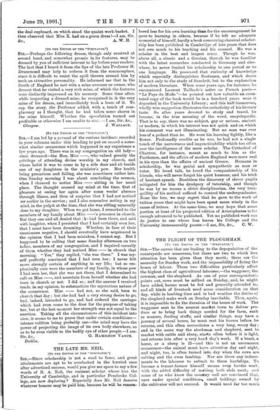[To THE EDITOR OF THE "SPECTATORM Sur,—I am led by
a perusal of the curious incidents recorded in your columns under this heading to put on record a some- what similar occurrence which happened in my experience a few years ago. There was in my congregation an old lady— since deceased—the Hon. Miss —, who valued greatly the privilege of attending divine worship in my church, and whose habit it was to come in by a side door and sit beside one of my daughters in the minister's pew. Her health being precarious and failing, she was sometimes rather late. One Sunday morning I was about concluding the sermon, when I chanced to notice Miss — sitting in her usual place. The thought crossed my mind at the time, first of pleasure at seeing her again after some weeks' absence through illness, and then of surprise that I had not noticed ser earlier in the service ; and I also remember noting in my nind, in the pulpit at the time, that she was sitting unusually Jlose to my daughter. When we got home, I remarked to the members of my family about Miss —'s presence in church. But they one and all denied that E h3 had been there, and said with laughter, when I persisted that I had certainly seen her, that I must have been dreaming. Whether, in face of their unanimous negative, I should eventually have acquiesced in the opinion that I had been mistaken, I cannot say. But I happened to be calling that same Sunday afternoon on two ladies, members of my congregation, and I inquired casually of them whether they had noticed Miss — in church that morning. "Yes," they replied, "she was there." I was my- self perfectly convinced that I had seen her; I never felt more strongly certain of anything in my life; but so em- phatically sure were the members of my family, in whose pew I had seen her, that she was not there, that I determined to call on Miss —, and ascertain from herself whether she had been in church or not. I did so ; and the answer I received tends, in my opinion, to substantiate the mysterious nature of the occurrence. Miss — had not, so she said, been to church that day ; but she had had a very strong desire to go, had, indeed, intended to go, and had ordered the carriage, which had even come to the door for the purpose of taking her, but at the last moment her strength was not equal to the exertion. Taking all the circumstances of this incident into view, it seems to me to prove that under certain conditions— intense volition being probably one—the mind may have the power of projecting the image of its own body elsewhere, so as to be even visible to the bodily eye of other people.—I am,




















































 Previous page
Previous page